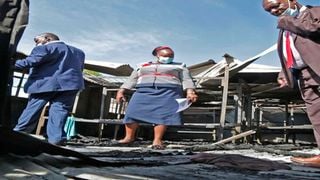
Ministry of Education officials assess the damage caused by fire in one dormitory at Amabuko Mixed Secondary School in Kisii on November 3, 2021.
| Ondari Ogega | Nation Media GroupEducation
Premium
302 students held over school fires this year
Three hundred and two students have been arrested over the burning of schools this year, the Ministry of Education says.
The report says 126 learners were apprehended between November 1 and 11, with the remaining arrests recorded from January 1 to October 30.
Some 41 students have been arraigned for arson and destruction of property while the other cases are being handled by school disciplinary committees.
According to the report signed by Education Cabinet Secretary George Magoha, drug abuse, congestion and communication breakdown between students and school managers are also to blame for the unrest.
“County security and intelligence committees have been directed to convene meetings with education stakeholders to discuss school unrest exhaustively,” Prof Magoha says.
Other school-based factors that leading to strikes are a congested calendar which has reduced the time for co-curricular activities, reduced extracurricular activities and inadequate guidance and counselling.
“Stringent administrative tendencies could be viewed as oppressive by the students, who are used to unlimited freedom at home,” the minister adds in the report.
Prof Magoha blames social media and TV, saying they tend to glorify violence.
He says students have easy access to the mainstream and social media.
The report adds that some schools have been accused of infringing on privileges enjoyed by surrounding communities, contributing to unrest.
“There is an element of poor role modelling. Parents have left their duties and responsibilities to teachers,” the study says.
Prof Magoha says some school managers are insensitive to the emerging trends in student behavioural adaptation, leading to conflicting approaches in correcting learners.
“If fathers do not provide leadership, confusion is eminent. That might explain why more than 70 per cent of the unrest has been reported in boys schools,” Prof Magoha says.
The CS says the ministry has directed schools to minimise the transfer of students.
The Ministry of Education plans to enhance CCTV coverage in schools by exploring ways of making the IT affordable, engaging stakeholders and recruiting professional counsellors.
Kenya Secondary School Heads Association chairman, Kahi Indimuli, said the decision by the ministry to allow students take a five-day mid-term break and allow co-curricular activities could help to reduce unrest.





